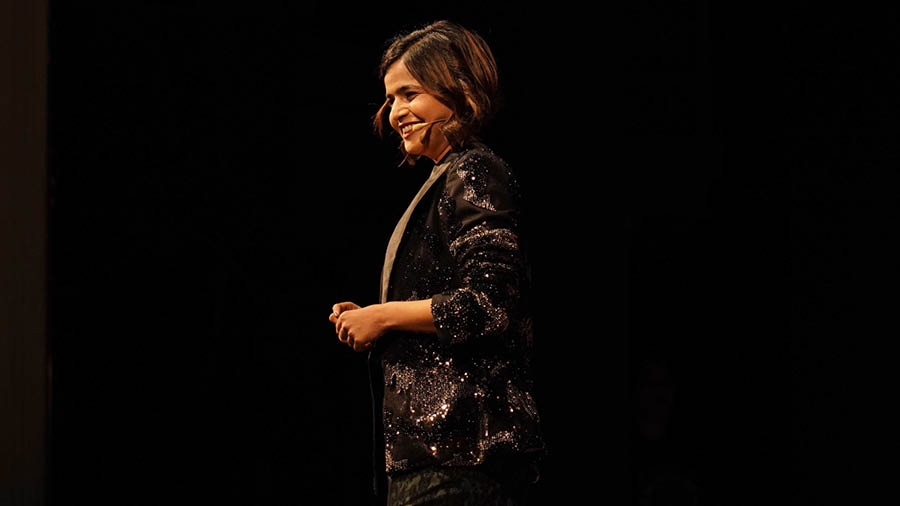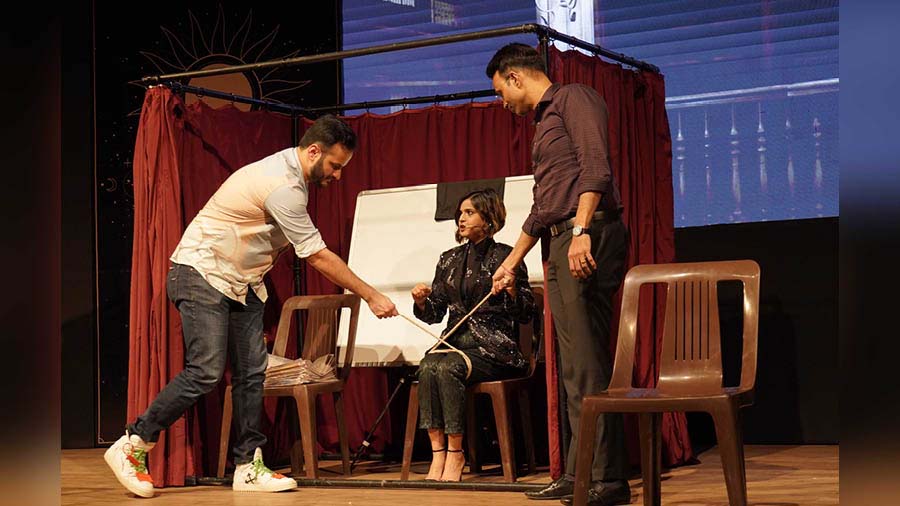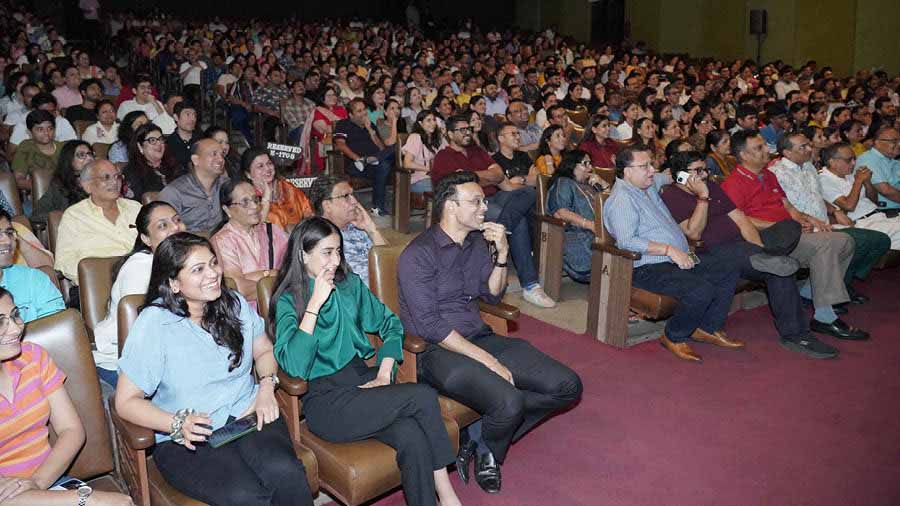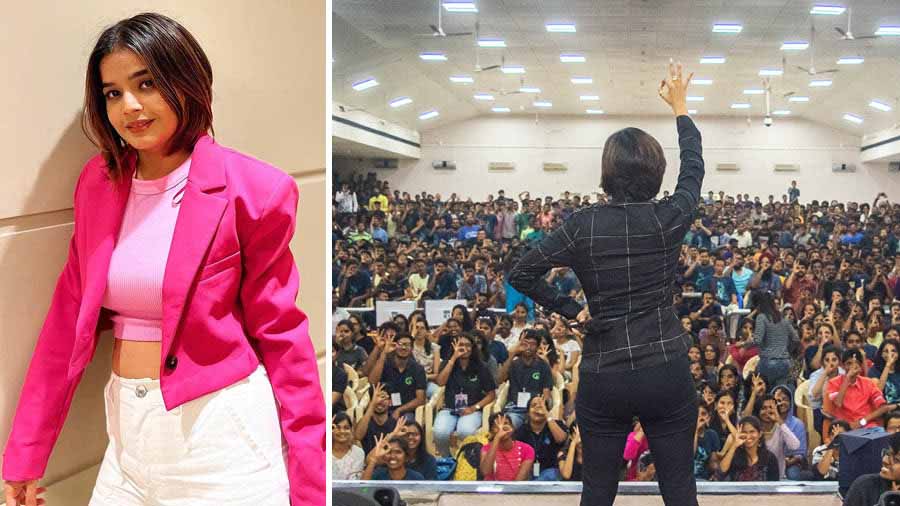Recall in your mind, your favourite colour, or your favourite song, and you can change your mind midway, and yet somehow in the end, Suhani Shah is waiting with a whiteboard to unveil your final answer.
The 33-year-old mentalist from Udaipur was in Kolkata on September 15 to kickstart her Chamatkar tour, wowing her audience as she read their minds, making the packed gallery at Kala Mandir believe in magic with her brilliant showmanship.
Suhani was six years old when she saw a magic show and television and knew she wanted to not just watch, but beat the magician. Her supportive parents stood by her as she trained with the assistants of magicians, and by age seven, she had her first show. From then to now she has travelled the world showing off her work, has authored books, has tricked big celebs from different industries, and even brought faith back into the life of an unwell man who was ready to give it all up.
My Kolkata caught up with Suhani after her Kala Mandir show for a chat. Edited excerpts follow…
My Kolkata: How was it performing in Kolkata?
Suhani Shah: It was amazing! I’ve performed in Kolkata several times and it always feels good because there’s this super energy that Kolkata has, which makes you feel comfortable, and they’re really sweet people. Every time I’ve been here I’ve got really good response. It was more special this time, because it was my first show of the tour. I was seeing people’s reactions to the activities of the tour for the first time. It was well received and people really enjoyed the show.
Tell us about your journey of getting into this art form.
The story of how I convinced my parents about my chosen profession was a bit exaggerated during the show (in Kolkata). In reality they agreed with me in a day. The first time I told them I wanted to be a magician, they said “okay.” They said, “Are you just saying it or do you really want to?” and they have been supportive since. My parents always took us (my brother and I) seriously. They made us feel important and included in major family conversations, even as kids, which boosted our self-esteem.
It was my father who told me that if they were investing so much time in my learning magic, then they didn’t want me to perform in schools or birthday parties, but on a big stage.
Magicians never reveal their secrets, so how exactly do you learn the art? Or do you create your own secrets?
It took me 11 months to learn things because we didn’t have the internet and no one really teaches magic. My parents came up with the idea that it might be easier to convince those who were magician’s assistants than the magicians themselves. It’s very difficult to find people, but somehow, we managed to find and convince this group of people who were assistants to magicians.
I had to tell them how passionate I am to want to do this. In the long run, it became a collective process that worked out well for everyone and they became part of my team for the next 10 to 15 years. They didn’t just teach me and leave, it was like a collective. When I started as a kid, it was difficult because I could not read the literature. Someone had to sit with me when learning the dialogues as well. They would read it and I’d try to remember, and we’d record them in cassettes that I would listen to them over and over. I would try to remember the dialogues, because there was no other way for me to read and remember them. We had to find ways to do bigger things because we didn’t want to do a small show. So, our shows were three-hour, 1,000-seater shows, and I was the sole magician on stage. The shows I was doing at seven were ones that had cutting a person in half, flying in the air and a disappearing car. For my very first show, the then chief minister of Gujarat, Shankersinh Vaghela, was present.

Suhani at Kala Mandir, Kolkata
So, from illusions, you went to mentalism?
I started with illusions, as opposed to mentalism or being a close-up magic illusionist. Back then, we had an auditorium for a month and we performed there every day. You have to work more on showmanship than the trick in mentalism — that’s a huge part of it all. Our assistants do a large part of the job, so I have to work more on my dialogue delivery, on my gestures, my positioning and timing on stage. As a kid, doing the trick is much easier than controlling the stage. The acts where you get in a box and disappear, you know them and it is easy. It’s the little things that don’t seem major that are the difficult part.
People have limited knowledge of what mentalism is and how it works. Does that work in your favour or would you like people to know more?
I definitely want people to know about the art form, which is happening overseas. People know about mentalism and they look at mentalism as an art form so there is more awareness, authenticity and respect. Now, India is getting there, and I think we’ve done a really good job of making people aware of what it really is. It takes time, but it is better than what it was when I started 26 years ago — forget mentalism, the overall art of magic was looked down upon. There used to be comments like “Jadu karti hai? Who is going to marry her? Her career is ruined.” From there to now, when we are like superstars and respected and this is considered an art form — we’ve come a long way and there’s a long way to go.
We’re sure you get some strange requests…
Oh, yeah! Sometimes they are funny, but other times they are very serious. From things like a spouse’s passport number, lottery tickets and exam questions to people asking me if I can tell what their autistic child is thinking, or what a parent in a coma is thinking, and more serious things that I cannot mention. It’s difficult to deal with that often but what makes it easier sometimes is being true to your art form. The first thing I always say is that I do not read minds, I create the illusion of reading minds. I’m never giving an impression that I have supernatural powers, I’m never telling people that I can solve your problems. So, when you’re true to your art form then giving answers becomes easier.

Suhani had two people tie her up during a segment of her show at Kala Mandir
You have been very vocal about how mind reading is an art and it’s not about having divine powers.
Let’s understand what mentalism actually is. Magic is the parent category and in magic, there is mentalism, escapology, street magic, close-up magic, illusions, pickpocketing and so on. Every mentalist is a magician, but not every magician is going to be a mentalist. When you meet somebody who tells you they are a magician, you should always ask them what kind of magician they are, like you would ask a doctor their specialisation. Once you understand that mentalism is magic, a lot of things get clear because everybody knows what magic is about. Hence, watching a person being cut in half in a magic show, no one thinks they have actually been cut in half. They know it’s a trick.
Secondly, mentalism doesn’t have any props. There is a whiteboard to write things on, but hardly any props. It’s a highly interactive art form when we talk to people and our best prop is the audience. The better the audience, the better the show! Also, everything happens with consent. Although it’s not real, it does have elements of hypnosis, and there are acts where we hypnotise people and they forget how to read. So, the person is unable to read but the audience can. It has parts of NLP or neuro-linguistic programming and elements from psychology, along with observing behaviour patterns, micro-expressions and a lot of tricks, of course.

The audience at Kala Mandir
It must be intimidating holding the attention of so many people while you trick their minds…
Another thing about magic is people love it when a magician fails. It is only the audience that is against the performer and that is the beauty of it. One person standing on stage in front of 1,000 people who want them to fail… it’s not easy but that’s the beauty of it. The more people think that what I’m doing is impossible, the more people want me to fail, but the better they react.
A mentalist’s job is to trick someone’s mind and you have previously said that the mind is the most personal thing anyone can have. So, do you feel a sense of responsibility when it comes to tricking someone against their own mind?
I don’t do that. I never do anything without someone’s consent. I only call the people who raise their hand and I always ask before revealing any information. I double-check! I will never say things without asking them or do anything that they don’t want to do.
It happened once over a decade ago when I was at a corporate event. The trick ended with me revealing the name of the person the participant had a crush on. He was sitting on the chair and I had the board and I told him to say the name out loud. He said he couldn't but I’d already turned the board to the audience. It turns out his wife was in the audience and it wasn’t her name on the board. After the show, the couple walked up to me and I realised the situation had become intense when he asked me to tell his wife that he was joking for entertainment and I was lying. And I said no, I would never do that for my heart.
An event where you helped a man who was really unwell with a trick you did with water is a story that changed your life, because he believed and he became better, and later got help…
Mentalism requires a lot of showmanship and confidence. That was the incident that got me into psychology and I started writing books, and everything happened after that.
You’ve also tricked quite a few celebrities. Can you name some who had one of the best reactions?
Honestly, I get great reactions from people because that’s the art form! If I tell you something about you, you’re going to flip! I got good reactions from Badshah, Kareena (Kapoor Khan), Rajkummar Rao, Martin Garrix! Martin Garrix was so much fun! With Boman Irani, I told him I would ask him who his favourite sportsperson was. He asked me, “Who do you want me to think about?” I said, “No, it’s up to you. You don't have to tell me.” We started rolling and four minutes later he said, “Is it okay if I think about this person? Is it okay if I think about Virat Kohli?” And I said, “You don’t have to tell me, it’s not scripted. Think whatever name comes to your mind, but not Virat Kohli since you already told me.” He insisted we script the video (laughs), but I said that’s not the point. In the end, he told me he was trying to catch me and he actually thought I scripted it. “If you look, it’s there in the video as well that I thought I was going to try and catch it,” he said.
Can anyone become a mentalist? Is it tough to pick up?
Yes, anyone can. Singing is difficult as well, but people can do it. They’re born with it, and in a few year’s time, they are singing well. I was doing magic at the age of six — everybody has a talent they are born with and should try to get to know what that is.
If someone wanted to become a mentalist, how would they go about it?
They could start with magic as a whole. In the same way you go to school to learn subjects, they should begin with magic as a whole and learn a little bit of close-up magic, a little bit of mentalism, a little bit of illusion, figure out audience management, and figure out their style. David Blaine has a different persona on and off stage; all magicians do. If you meet me outside, I’ll be very different compared to how I am on stage because that’s my stage persona. So, people should start performing first, understand the art form, understand different genres of magic, not just mentalism. You should attempt to know everything, and once you do that, you figure out more. You build your confidence in your art form and learn your persona, talking style and stage personality. Then you figure out your area of expertise.
